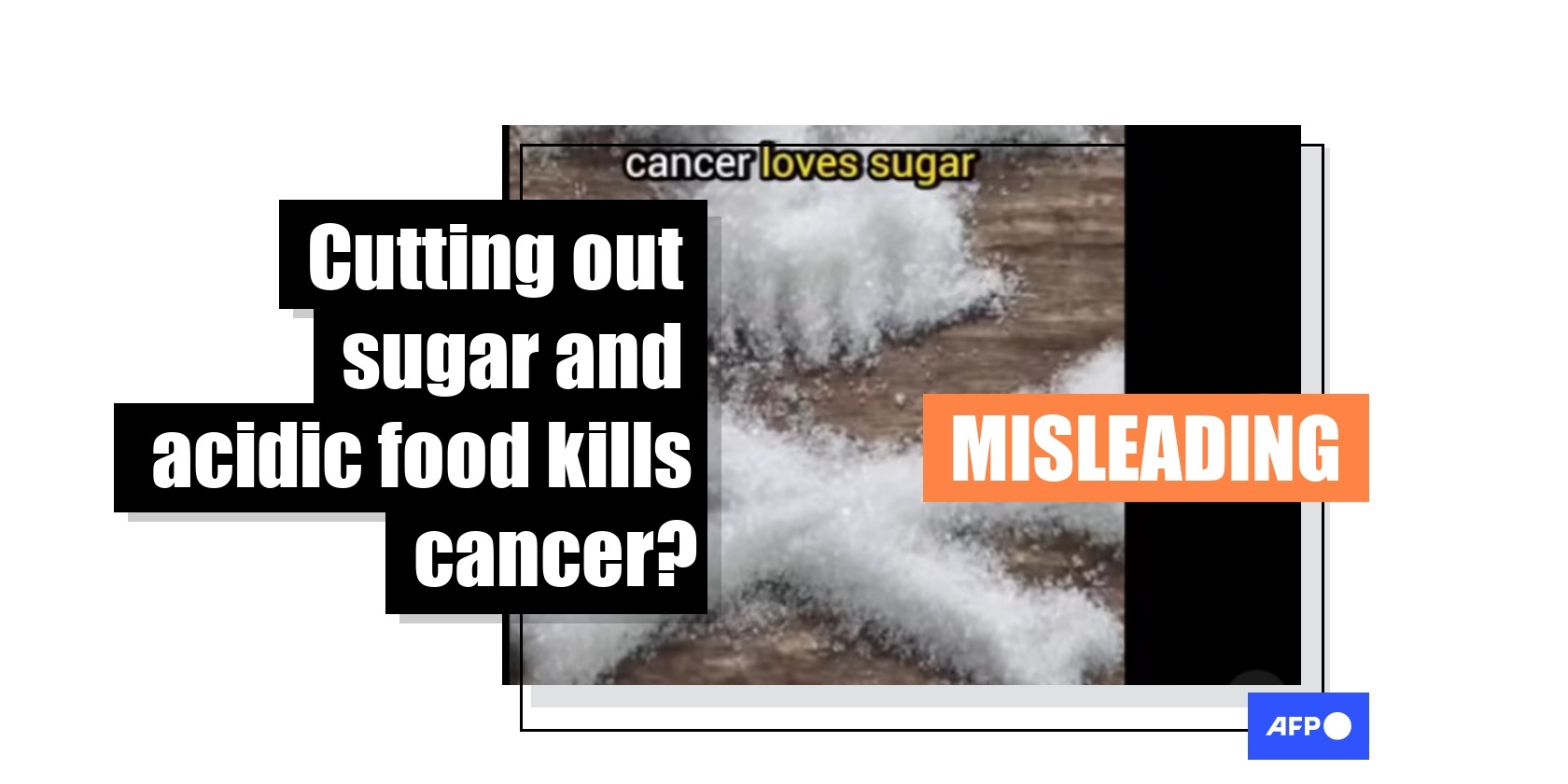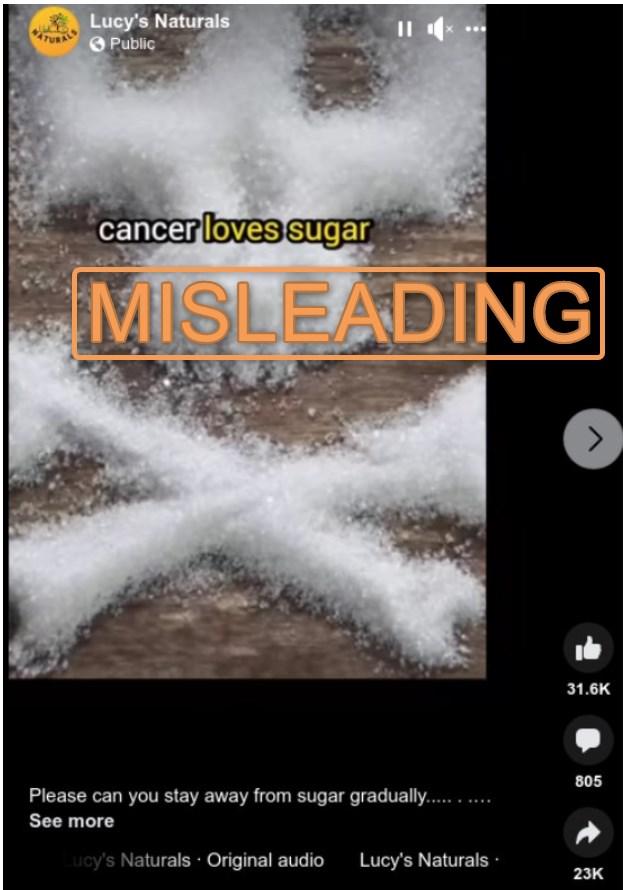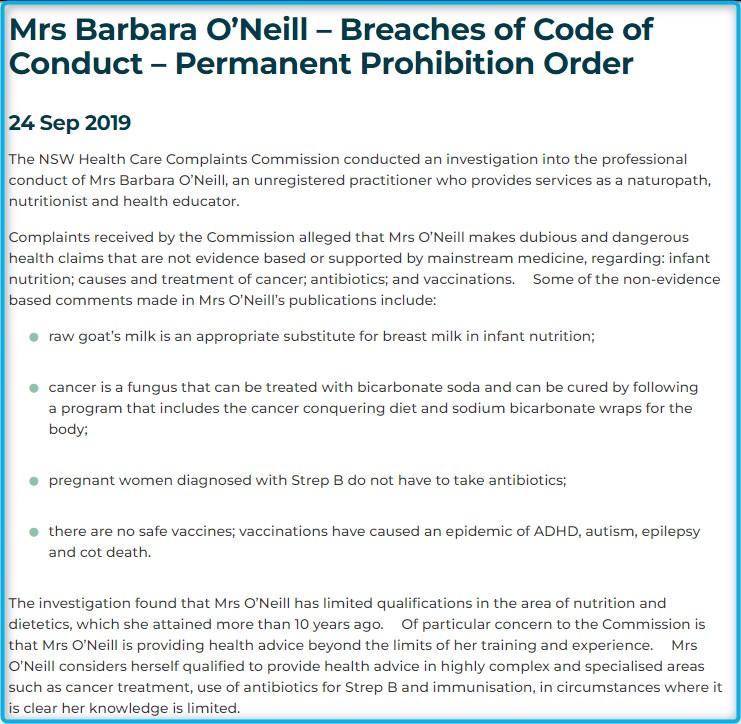
Experts say video misleads with claims about links between cancer, acidic foods and sugar
- This article is more than two years old.
- Published on August 21, 2023 at 14:52
- 5 min read
- By James OKONG'O, AFP Kenya
"Cancer loves sugar," reads the text on a Facebook reel published in Nigeria on a page called "Lucy’s Natural" in July 2023.
The video was shared more than 23,000 times and attracted nearly 32,000 likes before the post was removed.

In the video, a woman with an Australian accent says that cancer "loves" sugar. She adds that while there is "nothing wrong with the sugarcane", refined sugar is the problem.
Refined sugar is sucrose – sugar extracted from a natural source that has been processed, like granulated sugar from sugarcane (archived here).
"Cancer hates it when you stop the sugar," says the woman in the clip, alleging that an alkaline diet of vegetables essentially starves cancer cells.
The same clip was shared elsewhere on Facebook in Nigeria and Kenya.
But experts told AFP Fact Check that the claims are misleading.
Sugar and cancer
The relationship between sugar and cancer is one of the most commonly misunderstood relationships in oncology nutrition, according to Lauren Fay, a clinical nutrition manager at the non-profit Inova Schar Cancer Institute in the US state of Virginia.
"The confusion and fear is rooted in the simple statement that sugar feeds cancer which metabolically is absolutely true, but unfortunately often results in being interpreted that therefore, avoiding sugar starves cancer, which is not true," she told AFP Fact Check in August 2023.
When people consume sugar in either natural or processed forms, it is digested and enters the bloodstream as glucose.
"Glucose provides fuel to nearly all of the cells in the body: brain cells, lung cells, muscle cells, and cancer cells," Fay said. "So, while glucose does provide ‘fuel’ to cancer cells, it does not do so preferentially, and unfortunately, there is no clear evidence to support our ability to control glucose fuelling cancer cells through diet alone."
Additional research is needed to explore the relationship between sugar in a person’s diet and cancer, according to the Mayo Clinic. To date, studies have not found a direct link between the two, although the famous US medical research centre says there is some evidence that consuming large amounts of sugar can put a person at a higher risk of certain cancers.
Cancer Research UK also rejects the idea that excluding sugar from a diet can prevent or cure cancer.
"Unfortunately, it's not that simple. All our healthy cells need glucose too, and there’s no way of telling our bodies to let healthy cells have the glucose they need, but not give it to cancer cells," it said in an article updated in 2020 (archived here).
In 2019, Bangkok oncologist Dr Punlert Tanyakul told AFP Fact Check Thailand that a no-sugar diet was not recommended.
"It is certainly not good to cut sugar out of your diet as sugar is needed for every human being’s body. If you don’t have any sugar in your body, body cells will not be able to survive and will be unable to function."
However, "consuming too much sugar could increase the risks of cancer".
pH levels and cancer
The pH of a food is a measure of its acidity or alkalinity.
The idea that people cannot get cancer if their body’s pH is alkaline or if they turn their bodies alkaline by eating a diet of fruit to cure or prevent cancer are "absolutely false," said Dr Nigel Brockton, vice president of research at the American Institute for Cancer Research (AICR).
"Your body’s pH levels can’t prevent you from getting cancer," Brockton told AFP Fact Check in July 2023.
The pH scale (archived here) ranges from zero to 14. Seven is neutral; anything less is considered acidic while anything greater is alkaline. According to Brockton, the pH in human bodies is about 7.5, and yet, people still get cancer.
"Some diseases can make the blood more alkaline or more acidic, but those are pathologic conditions. Healthy people can’t change their body pH," Brockton said.
Fay from Inova Schar agreed.
"(The body’s pH) is regulated by our kidneys and lungs, and cannot be significantly altered through diet alone. Furthermore, it is not clear that the ability to create a more alkaline environment in the body would be able to slow cancer growth, as research suggests it is the cancer cell causing the acidic environment, not resulting from it," she said.
Common cancer treatment may include surgery, chemotherapy, radiation therapy, hormone therapy, immunotherapy or stem cell transplant, and is based on the stage of the disease. Sometimes, it is meant to cure the cancer while other times, the intention is to stop it from spreading further.
Misinformation peddler
The woman in the misleading video is Australian self-proclaimed naturopath Barbara O’Neill who was banned for life (archived here) from providing health-related services by the New South Wales Health Care Complaints Commission.
In its findings, the commission said O'Neill "poses a risk to the health and safety of members of the public".
"The misinformation has huge potential to have a detrimental effect on the health of individuals as … O’Neill discourages mainstream treatment for cancer, antibiotics and vaccination," the report said.

Yet, people continue to share her home remedies, like this Facebook post from August 6, 2023, which falsely claims that baking soda cures cancer.
A Nigerian Instagram account sharing misinformation on the use of alternative medicine and home remedies for cancer and other serious health conditions was created under O’Neill’s name in July 2023.
O’Neill herself still lectures on health and nutrition — AFP Fact Check found adverts for "lifestyle" events advertised online as recently as August and July 2023.
The Medical Council of New South Wales confirmed that O’Neill is not registered by the Australian Health Practitioner Regulation Agency as a medical practitioner in the country (archived here).
"Barbara O’Neill is not currently registered as a medical practitioner or other health practitioner in Australia. Alternative medicine is not considered a valid health profession by regulators in Australia," the council told AFP Fact Check.
AFP Fact Check recently debunked a similar claim about sugar here.
Copyright © AFP 2017-2026. Any commercial use of this content requires a subscription. Click here to find out more.
Is there content that you would like AFP to fact-check? Get in touch.
Contact us
